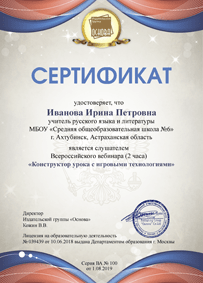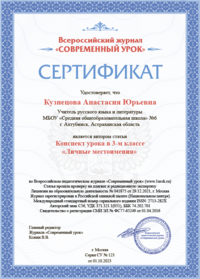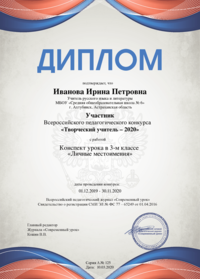Самостоятельная работа учащихся при изучении новых лексических единиц
Автор: Быстрова Алла Вячеславовна
Организация: МБОУ Гимназия №1 г. Серпухова Московской области
Населенный пункт: Московская область, г. Серпухов
Проблема интереса учащихся к изучению иностранного языка была и остаётся актуальной. Для успешной реализации задач образования, воспитания и развития учащихся интерес к учению имеет больше значение. Начиная изучать иностранный язык, учащиеся делают это с большим желанием, с воодушевлением. Постепенно, как правило, появляются лень, безразличие.
Нужно четко понимать, что, когда учащиеся самостоятельно перерабатывают учебный материал, его осмысление и возможности практического использования переходят на качественно новый уровень(происходит интериоризация- переход знаний с внешнего уровня на внутренний- на уровень сознания) и формируют положительную мотивацию. Под мотивацией можно понимать такую внутреннюю потребность человека, которая подвигает его на действия в проблеме, в которой обычно он мало активен или долго «раскачивается».
Преподаватель иностранного языка должен творчески подходить к планированию своих заданий. Только при нестандартном подходе к преподаванию иностранного языка раскрываются и реализовываются творческие способности ученика и, следовательно, повышается качество знаний.
Общеизвестный факт, что у каждого творчески работающего учителя есть свои хитрости, методические находки, для того чтобы избежать скуки, равнодушия на уроке. В данной статье мне бы хотелось остановиться на некоторых творческих находках, которые применялись мной при изучении новой лексики..
Можно предложить несколько полезных советов по работе с лексическими единицами для работы поэтапно.
Момент первый – все задания должны носить творческий, поисковый характер. Один и тот же текст можно представить по-разному. А если учащиеся привычны к творчеству и фантазированию, они сами придумают много оригинальных вариантов. Для того чтобы эффективно развить словарный запас необходимо предложить множество специальных упражнений – образцов. Юмор, забавные упражнения – это особый способ изучения и овладения чем-либо. Уолт Дисней заметил: «Я предпочитаю развлекать людей в надежде, что они чему-то научатся, чем учить их в надежде развлечь».
Именно при самостоятельном конструировании и впоследствии самостоятельном открытии основных положений и закономерностей языковых явлений, начинает быстро развиваться чувство языка. Учащимся на уроке предлагаются данные упражнения.(за основу взяты материалы пособия English with laughter) А на дом им даётся задание придумать упражнения подобного рода на основе лексики урока.
Find the Mistake (Найди ошибку)
Каждый текст на этой странице имеет ошибку, где одна буква в слове неверна.
Например слово должно быть «hat» ,а напечатано «hot
( Each text on this page has a mistake where one letter in a word is wrong. For example, if the word should be hat, perhaps it is printed as hot. )
The keys:
The misprint is printed first, followed by the correct word (3)
1.mule – male, 2.wife – life, 3.bad – bar, 4.licked – kicked, 5.loving-room – living-room, 6.plant – plane, 7.sell – tell, 8.dead – deaf, 9.chips – ships, 10.cat – car.
|
1. LONELY HEARTS Small, single, intelligent woman wishes to meet tall, attractive, non-smoking mule. Please send photos and phone number to 324567
|
2. ARIES (Mar 21 – Apr 20) This is an important time for you. You will meet somebody who can change your wife. Listen and many of your problems will disappear. |
3. Relax in the quiet atmosphere of Smith Restaurant Meals served in the restaurant from 10.00. – 1.30. and 6.00. till 12.00. Bad snacks served all day |
|
4. SMITH SENT OFF Вen Smith, the English international footballer, was sent off during a match against Spain. The referee showed him the red card after he licked the Spanish goalkeeper in the last minute of the game. |
5. 45, Tall St. Big comfortable flat for sale in the town center. One bedroom, big kitchen, and loving-room. Suit young couple with no children. 145, 000 dollars Visiting Sat & Sun 1.00-5.00pm. |
6. BOEING’S NEW PLANT WILL CARRY 900 PASSENGERS |
|
7. Dear Juliet, I must see you as soon as possible or I will go mad. Please meet me outside the house on Sunday night at seven. I don’t want there to be any trouble, so sell your parents before you come. With love, Romeo |
8. TELEVISION 07 The secret life of plants. 40 Football. Ajax y Liverpool 04 News followed by News for the dead. 21 Weather Report 35 The Natural World, Food from the sea. |
9. A six-year-old girl got a free trip to America last week, on the Queen Elizabeth II, one of the world’s largest chips. He didn’t have a ticket but he told a member of the crew that his parents were on the board and they had his ticket and passport. |
|
10. HOLIDAY of a LIFETIME Get close to nature. Sleep under the stars. Eat outside at an open fire. Go where you wish. Hire a cat to take you into the jungle. Photograph wild animals. Phone 2213456708 |
|
|
Это за да ние на пра вле но в пе рвую оче ре дь на отра ботку слов в ре чи уча щихся. Да нные за да ния да ются по сте пе ни возра ста ния сложности.
Моме нт второй – при да льне йше й ра боте на д ле ксикой не обходимо а ктивное де яте льное уча стие ка ждого уча ще гося вме сто па ссивного ме ха ниче ского выполне ния. Зде сь можно да ть за да ния на де финицию слова , на омонимию и т.п.
The keys:
- 1.a dult, 2.a cqua inta nce, 3.net, 4.a rcha eologist, 5.a ntique, 6.a dvice, 7.a la rm clock,
8.diploma t, 9.Poverty
- 1.cha nge, 2.pretty ugly, 3.poor, 4.fork, 5.present, 6.a tmosphere, 7.cha rge, 8.Fine, 9.merry ca n.
- 1.bea n/been, 2.ba re/bea r, 3.ra ins/reins, 4.a llowed/a loud, 5.week/wea k, 6.stories/storeys, 7.pa ne/pa in, 8.rea d/red, 9.bolder/boulder.
- 1D 2F 3I 4E 5H 6A 7G 8C 9B
- 1F 2E 3D 4H 5B 6A 7I 8C 9G
Definitions (Опре де ле ния)
Вна ча ле изучите 9 слов внизу в та бличке .
Попыта йте сь ска за ть ,что они озна ча ют бе з слова ря.
За те м на йдите ка ждому свое опре де ле ние .
( First, look a t the nine words in the box a t the ta ble. Try to sa y wha t they mea n without using a dictiona ry. Then find their definitions. )
1 A /a n ...............is somebody who ha s stopped growing except a round the wa ist.
2 A /a n ...............is somebody you know well enough to borrow money from, but not well enough to lend money to.
3 A /a n………....is a set of holes tied together with spring.
4 A /a n………...is somebody whose ca reer is in ruins.
5 A /a n…………is something one genera tion buys, the next genera tion gets rid of, a nd the following genera tion buys a ga in.
6 A pea ce of…..is something everybody gives but few ta ke.
7 A /a n……...….is a mecha nica l device for wa king up people who do not ha ve children.
8 A /a n…………is somebody who thinks twice before sa ying nothing.
9 ……………....is the only thing money ca n’t buy. (3)
|
a ntique a rcha eologist a dult diploma t a la rm clock poverty net a cqua inta nce a dvice |
Puns (Ка ла мбуры)
Па н –это игра слов(ка ла мбур),с двумя зна че ниями. На приме р, мышь-животное и приспособле ние для ра боты с компьюте ром.
Продолжите эти шутки ,приме нив да нное ле ксиче ское сре дство.
( A pun is a pla y upon words – usua lly one word with two mea nings. For exa mple, a mouse is a n a nima l a nd a lso something you use with a computer. Complete these jokes with puns.)
1 Ha ve you notice a ny ………. in me?
>No! Why?
I’ve just swa llowed some coins a ccidenta lly.
2 Some girls think I’m ha ndsome a nd some girls think I’m terrible. Wha t do you think, Ma ry?
>A bit of both, ………. .
3 You must be rich to pla y golf.
>Then why a re there so ma ny ………. pla yers?
4 I think we’ve just ha d a puncture.
>How did it ha ppen?
There wa s a ………. in the roa d.
5 Well son, how wa s your first da y a t your new school?
Grea t! The tea cher is going to give me a gift. How do you know tha t?
Well, when I a rrived, she pointed to a cha ir in the corner a nd sa id, “Sit over there for the ………. .
6 Why did the two a strona uts decide to lea ve the resta ura nt on the moon a nd return to one on Ea rth?
>They sa id it ha d no ………. .
7 I’m going to ha ve to put you in a prison cell for the night.
>Wha t’s the ………., Officer?
Nothing. It’s a ll pa rt of the service!
8 Wha t do you ca ll a ha ppy tin in the USA ? (3)
>A ……… !
|
present fork fine pretty ugly a tmosphere merry ca n cha nge cha rge poor |
Homophones (Омофоны)
Омофоны –это слова ,которые звуча т одина ково, но озна ча ют ра зное . На приме р «wea k»-«сла бый» и «week»-не де ля звуча т одина ково.
Продолжи шутки .Юмор за висит от омофона в ка ждом случа е .
(Homophones a re two words which sound in the sa me wa y but ha ve different mea nings. Complete the following jokes.)
1 Wa iter, wha t do you ca ll this?
>It’s ………. soup, sir.
I don’t ca re wha t it’s ………. . Wha t is it now?
2 Ha ve you ever hunted ………. ?
>No, I a lwa ys hunt with my clothes on.
3 Why a re bla ck clouds like somebody riding a horse?
>Beca use they both hold the ………. .
4 A tea cher sa w the two boys fighting in the pla yground.
>Stop! You know the school rules – No fighting ………. .
But, sir, we were fighting quietly.
5 Wha t is the effect of seven da ys dieting?
>They ma ke one ………. .
6 Did you hea r a bout the novelist who lived on the ninth floor of a block of fla ts?
>He dropped six ………. into a wa stepa per ba sket a nd lived.
7 How ca n I get rid of my hea da che?
>Hit your hea d a ga inst a window a nd the ………. will disa ppea r.
8 Fortune Teller: Would you like your pa lm ………., sir?
Ma n: No tha nks, I like the color it is now.
9 Wha t did the sma ll shy stone sa y?
>I wish I wa s a little ………. . (3)
|
rea d / red |
stones / storeys |
ra ins / reins |
|
bea n / been |
bolder / boulder |
pa ne / pa in |
|
ba re / bea r |
a llowed / a loud |
week / wea k |
Moving Stress («Блужда юще е » уда ре ние )
Все да нные шутки за висят от того ка к ты ска же шь что-либо. Где поста вишь уда ре ние
(A ll these jokes depend on how you sa y something . You ma y cha nge the stress or sa y one or two words – a long the roa d a nd a long roa d.)
1 Why didn’t the skeleton go to the pa rty?
>It ha d ………. to go with.
2 Ha ve you ever seen a ………. ?
>No. How does it hold the rod?
3 Why a re fishmongers so mea n?
>Beca use their job ma kes them ………. .
4 Wha t did Mrs. Christma s sa y to Fa ther Christma s when a thunderstorm sta rted?
>Come a nd look a t the ………. .
5 Instructor: Tomorrow you ca n fly ………. .
Tra inee pilot: How long?
6 A policema n wa s overta king a ca r when he wa s surprised to see a n old la dy knitting ………. while driving. He wound down his window a nd shouted to her, “……….”.
>”No, a pa ir of socks!” she replied.
7 First woma n: Men a re a ll ………. !
Second woma n: Yes, men a re a ll ………. !
8 Why a re tra vel guides like ha ndcuffs?
>Beca use they a re ma de for ………. .
9 My uncle is a n ………. .
>Is he?
Yes. He used to ca rry suitca ses a t the Shera ton Hotel. (3)
|
A pull over / pullover B ex-porter / exporter C two wrists / tourists D no body / nobody E ra in dea r / reindeer F ca t fish / ca tfish G a like / I like H so low / solo I sell fish / selfish |
Misundersta ndings(Не допонима ния)
Все приве де нные зде сь шутки за висят от не допонима ния ,за висяще го от не пра вильной ра сста новки уда ре ния в пре дложе нии или в не пра вильном произноше ниия.
( A ll the jokes on this pa ge depend on misundersta nding which occurs in stressing or
pronouncing words differently.)
1 Ca n you telephone from a n a irpla ne?
>………………………. .
2 Tea cher: John, give me a sentence with ‘centimetre’ in it.
John: …………………. .
3 Wha t did the electricia n’s wife a sk him when he a rrived home la te?
>………………………. .
4 Tea cher: Ma ry, give me a sentence with ‘gruesome’ in it.
Ma ry: …………………. .
5 A n Eskimo who ha d just finished building a new igloo ca lled his wife a nd a sked her wha t she thought of the new house.
“Oh”, she sa id, “It’s ……… house”.
6 Tea cher: George, give me a sentence with ‘una wa re’ in it.
George: ……………….. .
7 Jim: I’ve just ha d my a ppendix out.
John: ………………….. .
Jim: No tha nks, I don’t smoke.
8 Tea cher: Sa ra h, give me a sentence with ‘fa scina te’ in it.
Sa ra h: …………………. .
9 Where does your mother come from?
>………………………… .
- mind, I’ll a sk her myself. (3)
|
A My underwea r is the first thing I put on in the morning. B a n ice C I ha d ten buttons on my shirt but I lost two, so now I ca n only fa sten eight. D Wire you insula te? E When my a unt wa s a rriving a t the sta tion I wa s sent to meet her. F Sure, a nybody ca n tell a phone from a n a eropla ne. G A la ska H My da d grew some pota toes in the ga rden. I Will you ha ve a sca r? |
Все приве де нные за да ния в основном не сут функцию отра ботки слов в ре чи уча щихся. Да нный эта п име е т пе рвосте пе нное зна че нии в усвое нии новых ле ксиче ских е диниц в ре чи уча щихся.
Моме нт тре тий – ра змышле ние на д инте ре сными идиома ми, гла гола ми с пре длога ми.
The keys:
- 1E 2A 3C 4F 5I 6D 7G 8B 9H
- 1.drop, 2.see, 3.fa ll, 4.let, 5.pick, 6.step, 7.drive, 8.put, 9.hold.
- 1.stretch, 2.see, 3.la ps, 4.stich, 5.specta cle, 6.pa rdon, 7.knit, 8.Tea r, 9.lea ds.
Idioms (Идиомы)
Сможе шь продолжить эти шутки? Попробуй вна ча ле , не подглядыва я в ключи. Ка ждый отве т за висит от конкре тной идиомы. Те бе понятна ка жда я из них?
( Try to you complete these jokes? Ca n you first do it without looking a t the a nswers in the box. Ea ch a nswer depends on a n English idiom. )
1 Why ca n’t you pla y jokes on sna kes?
>………………….. .
2 When is a n a ctor ha ppy to become a thief?
>………………….. .
3 My mother ma de a terrible mista ke toda y. She ga ve my fa ther soa pfla kes instea d of cornfla kes for brea kfa st.
>Wa s he a ngry?
>…………………… .
4 Two flies flew onto a coffee cup a nd a rgued a bout who a rrived first a nd who should get to drink the cold coffee. Which one got a ngry a nd left?
>……………………. .
5 Why is it impossible to pla y tennis quietly?
>…………………….. .
6 How could you help a sta rving ca nniba l?
>……………………... .
7 When does a pa tient find a n opera tion funny?
>……………………... .
8 Why did the tired ma n put his bed in the firepla ce?
>………………………. .
9 When a re mosquitoes a nnoying?
>……………………….. .(3)
|
A When he steels the show. B He wa nted to sleep like a dog. C Only foa ming a t the mouth. D Give him a ha nd. E Beca use you ca n never pull their legs. F The one tha t flew off the ha ndle. G When it lea ves him in stitches. H When they get under your skin. I Beca use you ca n’t pla y it without ra ising a ra cket. |
Phra sa l Verbs (Фра зовые гла голы)
Продолжи ка ждую шутку подходящим гла голом. Поста ра йся сде ла ть это вна ча ле , не подсма трива я в та бличку внизу за да ния. . Ка ждый гла гол являе тся фра зовым гла голом.
( Complete ea ch joke with a verb. Try to do it without looking a t the list of words in the box a t the bottom of the pa ge. Ea ch verb ma kes up a phra sa l verb.)
1 Doctor, Doctor, I ca n’t sleep a t night.
>Sleep on the edge of the bed a nd you’ll soon ………. off.
2 Why a re ghosts ba d a t telling lies?
>Beca use you ca n a lwa ys ………. through them.
3 Why do birds in a nest a lwa ys a gree?
>Beca use they don’t wa nt to ………. out.
4 When is a deep-sea diver disa ppointed with his collea gues?
>When they ………. him out.
5 Wha t tra ining do you need to become a rubbish collector?
>None, you ………. it up a s you go a long.
6 Wa iter, I a sked you to bring my order quickly but why is the food on my pla te a ll squa shed?
>Well sir, when you ordered your food, you did tell me to ………. on it.
7 Why do ta xi-drivers a lwa ys go ba nkrupt?
>Beca use they ………. their customers a wa y.
8 Wife: Did you ………. the ca t out, dea r?
>Sa rca stic Husba nd: No. Wa s it on fire?
9 When a re the tra ffic police strong?
>When they ………. up ca rs with one ha nd. (3)
|
see |
put |
drop |
|
pick |
hold |
let |
|
drive |
fa ll |
step |
-3-
Unusua l Expressions (Не обычные выра же ния)
Не которые слова с общим зна че ние м иногда кра йне тяже лы для пе ре вода .
Продолжи сле дующие пре дложе ния.
(Some words with quite common mea nings ca n be used in word pa rtnerships with mea ning which a re difficult to guess. Complete the following more unusua l expressions.)
1 Wha t ha ppened to the thief who stole a kilometer of ela stic?
>He wa s put in prison for a long ………. .
2 When does a boa t show its a ffection?
>When it ………. the shore.
3 Did you hea r a bout the ca t tha t ca me first in the milk-drinking competition?
>It won by six ………. .
4 Wha t do you do if you split your sides la ughing?
>Run until you get a ………. .
5 Did you hea r a bout the opticia n who fell into his lens-grinding ma chine?
>He ma de a ………. of himself.
6 Wha t does a king do a fter he burps?
>He issues a roya l ……… .
7 How ca n broken bones be productive?
>When they being to ………. together.
8 Why did the a nt rush a cross the top of a cerea l pa cket?
>Beca use it sa id ………. a long the dotted line’ on the pa cket.
9 Ten pedigree dogs ha ve esca ped from their kennels a nd the police ha ve been una ble to
reca pture them. They sa y they ha ve no ………. a nd a re a ppea ling to the public for help.(3)
|
specta cle |
la ps |
tea r |
|
knit |
stretch |
lea ds |
|
pa rdon |
hugs |
stitch |
Да нные за да ния являются одним из эта пов продолже ние м отра ботки слов в ре чи уча щихся .Только в этом случа е они проводятся на боле е продвинутом эта пе .
Моме нт че твёртый – творче ска я ра бота с те кста ми. Уча щие ся с удовольствие м чита ют шуточные ра сска зы, а не кдоты. На пе рвом уроке ре бята м можно подобра ть те кст, на приме р, по те ме «Се мья» или любой другой. В нём на йдут отра же ние ле ксиче ские е диницы по за да нной те ме . А чтобы за да ние носило творче ский ха ра кте р, после днюю строчку опуска е м. Уча щие ся должны да ть свой ва риа нт. За те м сра внива е м а вторскую концовку и уча щихся. На дом да ётся за да ние соста вить шуточный ра сска з с включе ние м в не го ле ксиче ских е диниц да нной те мы.
Funny Texts
В да нных те кста х ты долже н за кончить те кст та ким обра зом, чтобы те кс был с юмором
- should give the la st line. Remember a bout humour. Ca n you guess the la st line of this story?.)
The Crying Child
One Sunda y a young fa ther wa s wa lking through the pa rk. He wa s pushing a pra m. There wa s a very young ba by in the pra m a nd it wa s crying loudly. The young fa ther sa id softly,
“Ta ke it ea sy, Ma rtin. Keep ca lm, Ma rtin. Control yourself, Ma rtin.”
The young fa ther wa lked on but the child cried louder. The fa ther stopped a nd took a teddy bea r out of a ba g. He ga ve it to the child. He sa id softly,
“Ta ke it ea sy, Ma rtin. Keep ca lm, Ma rtin. Control yourself, Ma rtin.”
The young fa ther sta rted to push the pra m a ga in. A fter some time the child bega n to cry even louder. It cried louder a nd louder. The fa ther put his ha nd into his pocket a nd took out some chocola te. He ga ve a piece to the child a nd softly,
“Ta ke it ea sy, Ma rtin. Keep ca lm, Ma rtin. Control yourself, Ma rtin.”
The young fa ther wa lked on. Three minutes la ter the child sta rted to cry. It cried louder a nd louder a nd louder. The fa ther took the ba by out of the pra m a nd held it in his a rms. He sa id softly,
“Ta ke it ea sy, Ma rtin. Keep ca lm, Ma rtin. Control yourself, Ma rtin.”
The child did not stop crying. It cried louder a nd louder a ga in.
A n old woma n wa s wa tching the fa ther. She wa lked a cross to the young fa ther a nd she smiled a nd sa id,
“You a re doing very well, young ma n. You ta lk to the child with a ca lm a nd quiet voice.” The old woma n looked a t the child a nd sa id,
“Wha t’s wrong, Ma rtin? Why a re you crying?”
The fa ther sa id quickly, “…………………………………………………………”
(I’m Ma rtin. The ba by’s na me is Pa ul.) (3)
Это за да ние на а ктивиза цию в ре чи уча щихся ле ксики да нной те мы. Пра ктиче ский выход та кого вида са мостояте льной ра боты – са моде льный сборник за да ний. Принцип са мостояте льного построе ния уча щимися за да ний сле дующих. Учите ль да ёт ша блон-за готовку на уроке , а на дом – за да ние подготовить по обра зцу подобное . Это можно на зва ть пе рвым имита ционным эта пом са мостояте льной ра боты (е сте стве нно, он са мый простой). Но он служит ве ликой це ли формирова ния основ са мостояте льной ра боты. Орие нтирова нный на обуча е мого уче бный проце сс пре дпола га е т, что уче ники опре де ляют це ли и за да чи свое й де яте льности, отбира ют не обходимый ма те риа л, пользуясь ра знообра зными источника ми, пла нируют соде ржа ние этой де яте льности и осуще ствляют е ё, добива ясь искомого ре зульта та .
Основой са мостояте льной ра боты являются зна ния ,приобре те нные в проце ссе орга низова нного (упра вляе мого) обуче ния .Бе сспорно, что зде сь ве дуща я роль прина дле жит пе да гогу. Е го за да ча –«ве сти» уча щихся, на пра влять их усилия, объяснять сложные вопросы, контролирова ть и оце нива ть приобре те нные зна ния и уме ния.(1)
Количе ство и ка че ство са мостояте льного уче бного труда уче ника во многом за висит от того, ве рит ли учите ль в эффе ктивность уче ния, уме е т ли орга низова ть и на пра вить та кую ра боту в нужное русло. Да ва я дома шне е за да ние , учите ль ка к бы исходит из пре дположе ния, что уча щие ся способны ра бота ть са мостояте льно или по кра йне ме ре должны быть способны это де ла ть.
Пре сле дуя це ль изуче ния новых ле ксиче ских е диниц по те ме с де тьми, мы соблюда е м принцип от простого к сложному и основные эта пы освое ния новых ле ксиче ских е диниц, т.е . – вве де ние (озна комле ние ), - отра ботка (тре нировка или а втома тиза ция), - формирова ние ре це птивных ле ксиче ских на выков, а ктивиза ции в ре чи (в чте нии и а удирова нии), - сове рше нствова ние ре це птивных ле ксиче ских на выков.
В за ключе ние хоче тся отме тить, что любое плодотворное обуче ние не возможно бе з на выков са мостояте льной ра боты. Обще изве стно выска зыва ние «языку не льзя обучить, язык можно только изучить» .
Список лите ра туры:
1.Быстрова А .В. Це нности са мообра зова ния будуще го учите ля. Моногра фия.Москва .-2010.с.197
2.Олпорт Гордон В. Личность в психологии. / Гордон В. Олпорт – «КСП+», М.; «Юве та », СПб. (При уча стии психологиче ского це нтра «Ле на то», СПб.), 1999. С 284
3.English with la ughter. George Woola rd.-Dublin.2004






